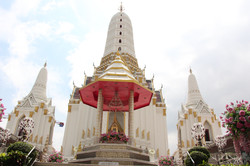Artwork Search
Arts in Southeast Asia Database
Phra Phuttha Prang
Keywords : Wat Phitchaya Yatikaram, The principal Prang of Wat Phitchaya Yatikaram, Phra Phuttha Prang
| Artwork alternative name | The principal Prang of Wat Phitchaya Yatikaram |
|---|---|
| Site common name | Wat Phitchaya Yatikaram |
| Type of artwork | Architecture |
| Sub district | Khlong San |
| District | Khet Khlong San |
| Province | Bangkok |
| Region | Central |
| Country | Thailand |
| Geographic Coordinates Decimal degree | Lat : 13.732461 Long : 100.496676 |
| Geographic Coordinates UTM | Zone : 47 P Hemisphere : N E : 661829.88 N : 1518638.75 |
| Place of artwork | Buddhavas area |
| History of production | When Somdet Chao Phraya Borom Maha Pichaiyat (That Bunnag) or Somdet Chao Phraya Ong Noi took a position of Praya Si Pipat Ratana Kosa Dhibodi, the chamberlain of Warehouse Deparment, he established Wat Phitchayayat and proposed it as a royal temple in King Rama III period. |
|---|---|
| Art | All three Prangs are on the same Paitee base (the shared ground base which supports many types of building together). The lower part of these three Prangs is the set of pointed-center lotus base. Ruean Dhatu of the principal Prang is the cruciform Mondop style. There are the sculptures of Giants standing and holding bats at the indented corners of Prang. The wall on the indented corners area is decorated with Kab Brahmasorn (a style of decoration on posts). The roof is a cruciform three-tiered tile roof. The roof is decorated with Chofa, in form of Nok Chao style (one head Naga), Bai Raka and Hang Hong in descending order. The spire has 6 tiers in stack decorated with tightly leaf-like petal sculptures. There also is a tier that is decorated with the angel sculptures putting the hands together on their chests, and the giant sculptures holding things over head motifs. Other two flank Prangs have the same forms. However, they are smaller. The roof has two tiers. The gables are plain triangles, no Nok Chao, Bai Raka, and Hang Hong. |
| Key academic information | The principal Prang of Wat Phitchaya Yatikaram, or sometimes called Phra Phuttha Prang, is composed of three Prangs which there is a big Prang in the middle placing the four Buddhas in Bhadrakalpa. The east Prang enshrines Phra Si Ariya Mettrai facing the big Prang and the west Prang enshrines the four Buddhas’ footprints in order. Building three Prangs together reminds us about Prang Sam Yod in Lopburi and some Prangs during the early Ayutthaya period which usually built the principal Prang with the small Prangs (wings) on both sides. Until Rattanakosin period, only Prang of Wat Phitchaya Yatikaram is composed of three prangs and it is the principal Prang of the temple. The plan of this Prang is the Prasada-style (tiered roof) building with four porch ends like cruciform plan (Jaturamuk). Each porch is covered with tiered tile roof The spire of Prang is composed of tiered leaf-like petal decoation with the multi-pronged spire on the peak. Another Prang with similar style of Prasada-style building with four porch ends like cruciform plan in the early Rattankosin period is Phra Phuttha Prang Prasat or Prasat Phra Thep Bidon in Wat Phra Sri Rattana Satsadaram which was built in King Rama IV period. The royal initiative to built it was for placing the Emerald Buddha. It is noticeable that the artisan who designed Phra Phuttha Prang Prasada or Prasat Phra Thep Bidon was HRH Prince Kromma Kun Rajasiha Vikrom who had worked with Somdet Chao Phraya Borom Maha Pichaiyat (That Bunnag) and other artisans of Bunnag family. This might be the reason that the two Prangs are related in some forms. |
| Period | Historical Period |
| Art period | Rattanakosin |
| Age | 24th Buddhist century |
| Religion | Buddhism |
| Sect | Theravada |
| Religion and belief | Theravada Buddhism |
| Type of License | Attribution-NonCommercial-NoDerivs (CC BY-NC-ND) |
|---|---|
| Rights | Princess Maha Chakri Sirindhorn Anthropology Centre |
| Date of record creation | 2016-09-15 |
| Record creator | Patsaweesiri Premkulanan |
| Bibliography | สุริยา รัตนกุล, คุณหญิง. พระอารามหลวงในกรุงเทพมหานคร. นครปฐม : มหาวิทยาลัยมหิดล, 2550-2552. ศักดิ์ชัย สายสิงห์.งานช่าง สมัยพระนั่งเกล้าฯ. กรุงเทพฯ : มติชน, 2551. |


